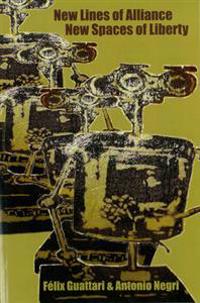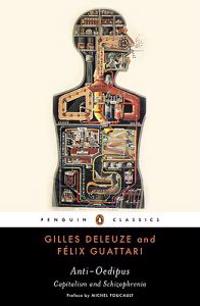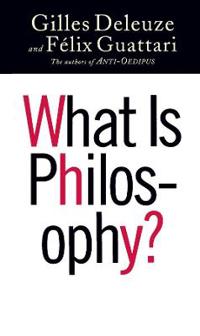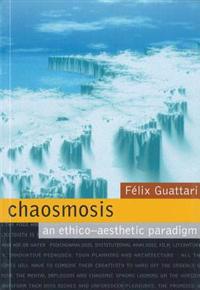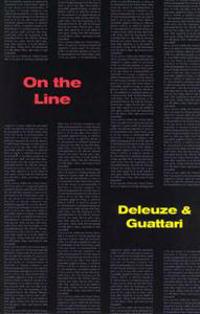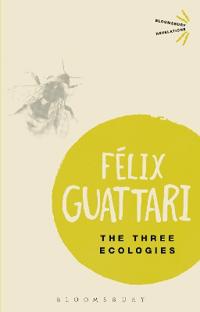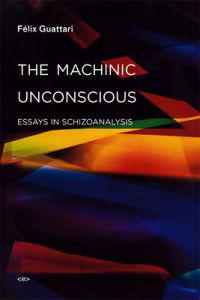Schizoanalytic Cartographies (Häftad)
avFelix Guattari, Felix Guattari, Robin MacKay, Christian Kerslake
ISBN: 9781441167279 - UTGIVEN: 201212Schizoanalytic Cartographies represents Felix Guattari's most important later work and the most systematic and detailed account of his theoretical position and his therapeutic ideas. Guattari sets out to provide a complete account of the conditions of 'enunciation' - autonomous speech and self-expre[...]
New Lines of Alliance, New Spaces of Liberty (Pocket)
avFelix Guattari, Antonio Negri, Felix Guattari
ISBN: 9781570272240 - UTGIVEN: 201101Anti-Oedipus: Capitalism and Schizophrenia (Häftad)
avGilles Deleuze, Felix Guattari
ISBN: 9780143105824 - UTGIVEN: 200905An "introduction to the nonfascist life" (Michel Foucault, from the Preface)
When it first appeared in France, "Anti-Oedipus" was hailed as a masterpiece by some and "a work of heretical madness" by others. In it, Gilles Deleuze and Felix Guattari set forth the following theory: Western society'[...]What is Philosophy? (Häftad)
avGilles Deleuze, Felix Guattari
ISBN: 9780231079891 - UTGIVEN: 199605Called by many France's foremost philosopher, Gilles Deleuze is one of the leading thinkers in the Western World. His acclaimed works and celebrated collaborations with Felix Guattari have established him as a seminal figure in the fields of literary criticism and philosophy. The long-awaited public[...]
Gilles Deleuze and Felix Guattari: Intersecting Lives (Övrig)
avFrancois Dosse
ISBN: 9780231145602 - UTGIVEN: 2010-06-11In May 1968, Gilles Deleuze was an established philosopher teaching at the innovative Vincennes University, just outside of Paris. Felix Guattari was a political militant and the director of an unusual psychiatric clinic at La Borde. Their meeting was quite unlikely, yet the two were introduced in a[...]
Gilles Deleuze and Felix Guattari (Häftad)
avFrancois Dosse
ISBN: 9780231145619 - UTGIVEN: 201110In May 1968, Gilles Deleuze was an established philosopher teaching at the innovative Vincennes University, just outside of Paris. Felix Guattari was a political militant and the director of an unusual psychiatric clinic at La Borde. Their meeting was quite unlikely, yet the two were introduced in a[...]
Anti-Oedipus: Capitalism and Schizophrenia (Häftad)
avGilles Deleuze, Felix Guattari
ISBN: 9780816612253 - UTGIVEN: 198312Thousand plateaus (Pocket)
avFelix Guattari
ISBN: 9780826476944 - UTGIVEN: 2004-10-14This book has set the agenda for contemporary Continental philosophy, arguing for a new theory of radical democracy in politics and art. A Thousand Plateaus completes the landmark philosophical project, Capitalism and Schizophrenia, which Deleuze and Guattari began with Anti-Oedipus.[...]
What is Philosophy? (Häftad)
avGilles Deleuze, Felix Guattari
ISBN: 9780860916864 - UTGIVEN: 199406"The question 'what is philosophy?' can perhaps only be posed lat in life, with the arrival of old age and the time for speaking concretely. It is a question posed in a moment of quiet restlessness, at midnight, when there is no longer anything to ask." Posing that question, Deleuze and Guattari wor[...]
Chaosmosis (Häftad)
avFelix Guattari
ISBN: 9780909952259 - UTGIVEN: 199501The final work by the author before his death in 1992, "Chaosmosis" is a radical and challenging work concerned with the reinvention and resingularization of subjectivity. It attempts to embody affective change, the short-circuiting of signification and the proliferation of sense necessary to engage[...]
On the Line (Pocket)
avGilles Deleuze, Felix Guattari, Gilles Deleuze
ISBN: 9780936756011 - UTGIVEN: 1983-06A rhizome may be broken, shattered at a given spot, but it will start up again on one of its old lines, or on new lines. You can never get rid of ants because they form an animal rhizome that can rebound time and again after most of it has been destroyed...There is a rupture in the rhizome whenever [...]
Nomadology (Häftad)
avGilles Deleuze, Felix Guattari
ISBN: 9780936756097 - UTGIVEN: 198601In this daring essay inspired by Nietzsche, Gilles Deleuze and Felix Guattari redefine the relation between the state and its war machine. Far from being a part of the state, warriers (the army) are nomads who always come from the outside and keep threatening the authority of the state. In the same [...]
Schizoanalytic Cartographies (Inbunden)
avFelix Guattari
ISBN: 9781441157270 - UTGIVEN: 2012-12-06The first English translation of a crucial work of twentieth-century French philosophy, in which Felix Guattari presents the most detailed account of his theoretical position.[...]
The Three Ecologies (Häftad)
avFelix Guattari
ISBN: 9781472523815 - UTGIVEN: 2014-04Extending the definition of ecology to encompass social relations and human subjectivity as well as environmental concerns, The Three Ecologies argues that the ecological crises that threaten our planet are the direct result of the expansion of a new form of capitalism and that a new ecosophical app[...]
Anti-Oedipus Papers, The (Övrig)
avFelix Guattari
ISBN: 9781584350316 - UTGIVEN: 2006-04-11"The unconscious is not a theatre, but a factory," wrote Gilles Deleuze and Flix Guattari in Anti-Oedipus (1972), instigating one of the most daring intellectual adventures of the last half-century. Together, the well-known philosopher and the activist-psychiatrist were updating both psychoanalysis [...]
Molecular Revolution in Brazil (Häftad)
avFelix Guattari, Suely Rolnik
ISBN: 9781584350514 - UTGIVEN: 200801Molecular Revolution in BrazilFelix Guattari and Suely Rolniktranslated by Karel Clapshow and Brian HolmesYes, I believe that there is a multiple people, a people of mutants, a people of potentialities that appears and disappears, that is embodied in social, literary, and musical events...I think th[...]
Chaosophy (Häftad)
avFelix Guattari
ISBN: 9781584350606 - UTGIVEN: 200812Chaosophy is an introduction to Felix Guattari's groundbreaking theories of "schizo-analysis": a process meant to replace Freudian interpretation with a more pragmatic, experimental, and collective approach rooted in reality. Unlike Freud, who utilized neuroses as his working model, Guattari adopted[...]
The Machinic Unconscious (Häftad)
avFelix Guattari
ISBN: 9781584350880 - UTGIVEN: 201101We certainly have the unconscious that we deserve, an unconscious for specialists, ready-made for an institutionalized discourse. I would rather see it as something that wraps itself around us in everyday objects, something that is involved with day-to-day problems, with the world outside. It would [...]
A Thousand Plateaus (Häftad)
avGilles Deleuze, Felix Guattari
ISBN: 9781780935379 - UTGIVEN: 201304A Thousand Plateaus is the second part of Deleuze and Guattari's landmark philosophical project, Capitalism and Schizophrenia - a project that still sets the terms of contemporary philosophical debate. Written over a seven year period, A Thousand Plateaus provides a compelling analysis of social phe[...]
Anti-Oedipus (Häftad)
avGilles Deleuze, Felix Guattari
ISBN: 9781780936611 - UTGIVEN: 201304The collaboration of the philosopher Gilles Deleuze and the psychoanalyst Felix Guattari has been one of the most profoundly influential partnerships in contemporary thought. Anti-Oedipus is the first part of their masterpiece, Capitalism and Schizophrenia. Ranging widely across the radical traditio[...]
The Three Ecologies (Häftad)
avFelix Guattari
ISBN: 9781847063052 - UTGIVEN: 200805Extending the definition of ecology to encompass social relations and human subjectivity as well as environmental concerns, The Three Ecologies argues that the ecological crises that threaten our planet are the direct result of the expansion of a new form of capitalism and that a new ecosophical app[...]


